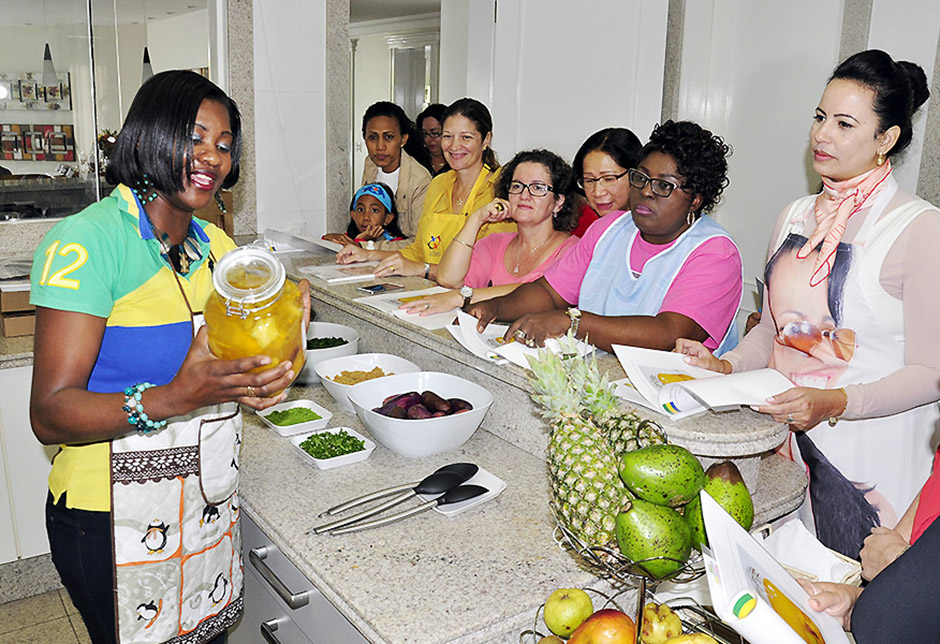[:pb]
Traditional gastronomy of Gabon is a success between ambassadresses in Brazil
Oda Paula Fernandes
While the politic matters heat up Brazil, at the embassy of Gabon, the ambassadress Julie Pascale Moudoute-Bell warmed up her kitchen’s stove, on June 23, to show her guests a little bit of the Gabonese gastronomy. She have welcomed a select group of friends, mostly from other embassies, for a tasting from coffee to lunch, in the official residency of Gabon in Brasília. The Gabonese cuisine is a delicious mixture of the French and the African gastronomy.

On the menu, minutely elaborated for the diplomatic event, there were traditional dishes of the typical Gabonese culinary. Sweets made from coconut and sweetened condensed milk looked more like our cocada baiana. In the sour dishes, Brazilian ingredients as the plantain and the dendê oil harmoniously joined the wine produced in Gabon. The true French champagne gave the final delicate touch to the surprising spicy flavors. All made with ingredients brought from the African continent to enchant and surprise the more refined tastes.
“We want to show the world the delicious things of our culinary. I receive today this friends that still did not taste dishes that are appreciated by my people. I made everything with a lot of dedication to guarantee the original flavor, with treats brought specially for us here in Brazil”, says the hostess Julie. The ingredients and the wine are mostly brought from Gabon; it is produced in the country and imported to various parts of the world.

In the tasting, there were present the ambassadresses of Japan, Keiko Umeda; Sri Lanka, Maujulika Jaiasuryia; Nigeria, Toyin Zainab Emozozo; Congo, Laurentine Silvain-Goma; Arab States League, Nadia Alem; Jordan, Hoda; the wife of the ambassador of the East Timor, Gregório Sousa; the president of Brasília Conection, Fátima Kreimer; the legislative advisor, Letícia Barbosa; the jewelry and wife of the president of the Association of Parents and Students Lycée François, Emma Villedroin; the dentist and businesswoman Rita Trindade, and to animate the lunch even more, the host of the program Talking with the world – on TV Supren – Wilian Gsaint.

Menu – The typical dishes of the Gabonese regions, previously prepared by Julie in the night before the event, were finalized with the help of the guests that, among smiles, drinks and good talk, served the lunch. Cameroon, plantain, cassava in straw banana and ice-culled crab made the joy of the guests who, curious, accompanied the finishing of the dishes.
But the lure of the table, the dish that drew the most attention, was the nyemboue au poulet fumé, chicken in sauce with dendê oil, ingredient widely used in the Brazilian cuisine, typical of Bahia. It is usually used, however, in dishes such as fish stew and the famous acarajé baiano. “This chicken with dendê oil has an awesome taste, I never thought it was a perfect match”, says Rita Trindade. “I do not see this combination of ingredients in Brazil. For me, the chicken with dendê oil is wonderful”, adds Rita Trindade.
Letícia Barbosa was also surprised with the exotic and refined menu. “The smell was so great. When I tasted the dishes, the flavors, sweet and sour; it made me enchanted. Everything here is so delicious”, she comments. “And to know that this is the traditional food in Gabon, with Brazilian ingredients, like dendê, plantain and manioc; it became even more surprising. The food of Gabon is pretty delicious”, highlights Keiko Umeda.

Receita
Ingrédients: Niemboué
Sabores do Gabão são apresentados em evento diplomático
Culinária tradicional do Gabão faz sucesso entre embaixatrizes no Brasil
| Oda Paula Fernandes
Enquanto os assuntos políticos aquecem o Brasil, na embaixada do Gabão a embaixatriz Julie Pascale Moudoute-Bell aqueceu o fogão de sua cozinha, no dia 23 de junho, para mostrar um pouco da gastronomia gabonesa. Ela recebeu um grupo seleto de amigos, a maioria de outras embaixadas, para uma degustação desde o café da manhã até o almoço na residência oficial do Gabão em Brasília. A cozinha gabonesa é uma deliciosa mistura de gastronomia francesa e africana.
No cardápio minuciosamente elaborado para o evento diplomático, havia pratos tradicionais da culinária típica gabonesa. Doces feitos a partir de coco e leite condensado que mais pareciam a nossa cocada baiana. Nos pratos salgados, ingredientes tão brasileiros como a banana da terra e azeite de dendê se juntaram numa combinação harmoniosa com o vinho produzido no Gabão. O verdadeiro champanhe Francês dava o toque final delicado dos sabores picantes e surpreendentes. Tudo feito com ingredientes trazidos do continente africano para encantar e surpreender o paladar mais apurado.
“Queremos mostrar para o mundo as delícias da nossa culinária. Recebo hoje essas amigas que ainda não experimentaram pratos que são apreciados pelo meu povo. Fiz tudo com muita dedicação para garantir o sabor original, com iguarias que vieram especialmente para nós aqui no Brasil”, revela a anfitriã Julie. A maioria dos ingredientes usados nesta degustação, o café e o vinho foram trazidos do Gabão, são produzidos lá e importados para várias partes do mundo.
Estiveram presentes no evento de degustação as embaixatrizes do Japão, Keiko Umeda; do Sri Lanka, Maujulika Jaiasuriya; da Nigéria, Toyin Zainab Emozozo; do Congo, Laurentine Silvain-Goma; da Liga dos Estados árabes, Nadia Alem; da Jordânia, Hoda; a esposa do embaixador do Timor-Leste, Gregório Sousa, a presidente da Brasília Conection, Fátima Kreimer, a assessora legislativa Letícia Barbosa, a joalheira e esposa do presidente da Associação de Pais e Alunos Lycée François, Emma Villedroin; e a dentista e empresária Rita Trindade. E, para animar ainda mais o almoço, o apresentador do programa Conversando com o Mundo – na TV Supren – Wilian Gsaint.
Cardápio – Os pratos típicos das regiões gabonesas, previamente preparados especialmente por Julie na madrugada anterior, foram finalizados com a ajuda das convidadas que, entre risos, bebidas e boa conversa, serviram o almoço. Camarão, banana da terra, mandioca na palha de bananeira e casquinha de siri catado fizeram a alegria dos convidados que, curiosos, acompanharam a finalização dos pratos.
Mas a atração da mesa, o prato que mais chamou a atenção, foi o nyemboue au poulet fumé, o frango ao molho com azeite de dendê, ingrediente muito comum na culinária brasileira, típica da Bahia., porém, usado em pratos como moqueca de peixe e no famoso acarajé baiano. “Impressionante o sabor desse frango com dendê, jamais imaginei que fosse uma combinação perfeita”, ressalta Rita Trindade. “Não vejo essa combinação de ingredientes aqui no Brasil. Para mim, o frango com azeite de dendê é maravilhoso”, acrescenta Rita.
Letícia Barbosa também foi surpreendida pelo cardápio exótico e refinado. “O cheiro já estava bom. Quando provei o sabor dos pratos, doces e salgados, fiquei encantada, tudo aqui é delicioso”, comenta. “E saber que essa comida é tradicional no Gabão e leva ingredientes e temperos tão brasileiros, como o dendê, a banana da terra e mandioca, tornou-se ainda mais surpreendente. Muito gostosa a comida do Gabão”, ressalta Keiko Umeda.
História – Localizado no continente africano, o Gabão é um país que tem cerca de 70% de sua área coberta pro florestas tropicais. A grande diversidade na flora e na fauna confere ao país belezas naturais exuberantes. Já o território apresenta vazios demográficos, sendo, portanto, pouco povoado; a densidade demográfica é de 5,5 habitantes por quilômetro quadrado. Em 1886 o país se tornou colônia francesa, mas a independência só foi obtida no dia 17 de agosto de 1960, depois de ter sido explorada por portugueses, ingleses e holandeses. A economia do país gira em torno da produção do petróleo, correspondente a cerca de 50% do Produto Interno Bruto (PIB) nacional; também tem agricultura e produção de manganês, que lhe consagra a terceira maior renda per capta do continente africano.
[:]











